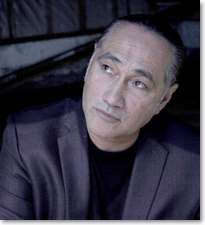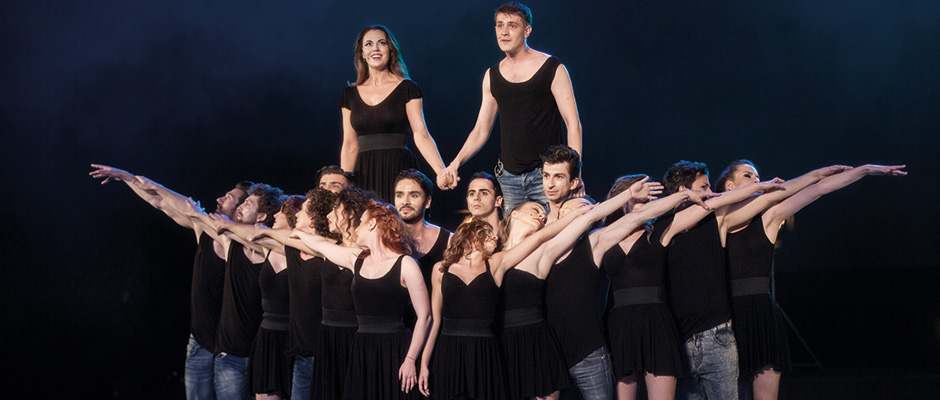World Theatre Ambassador Lemi PONIFASIO

Lemi Ponifasio is a prolific international theatre director, choreographer and artist. He is known for his radical approach to theatre, dance, art, activism, and for his collaboration with communities.
Distinctive and with its own unique genealogy, Ponifasio's creations defy conventional definitions. In his artistic universe, Ponifasio orients the modern individual towards new cosmovisions and other dimensions of consciousness by way of the decelerated rhythm of his strict aesthetic - a palette of black, inverted, dreamlike images; the ceremonial, sacrificial body; a visceral space of sound, light and darkness.
Ponifasio presents and exhibits his work worldwide including the Avignon Festival, BAM New York, Ruhrtriennale, Edinburgh International Festival, Théâtre de la Ville Paris, Onassis Cultural Centre Athens, London’s Southbank, Holland Festival, Luminato Festival, Vienna Festival, Berliner Festspiele, Santiago a Mil Chile, Theatre Der Welt Germany, Prague Quadrennial and the Venice Biennale.
While firmly established within the international avant-garde, Ponifasio grounds his work within local communities, and Maori and diverse Oceanic cultures, exploring complex forms of knowledge such as oratory, navigation, architecture, dance, performance, music, ceremony, philosophies, and genealogies as a driving force in emphasising local-oriented arts, indigenous cultural recovery, language and knowledge, thought and narratives that have been silenced or excluded.
Ponifasio established MAU in 1995, as the philosophical foundation and direction of his work, the name of his work, and the people and communities he works with. MAU is the Samoan word that means the declaration to the truth of a matter as an effort to transform. MAU focuses on arts and culture, avant-garde, and philosophy. MAU seeks to transform the theatre’s power source, challenge the authority of theatre, and re-examine and question our current concept of what is human. It organises the creation of new art, workshops, symposia, and community meetings; activities to build new systems of knowledge and new cultures, to develop human consciousness and sentience to the ecological crisis of our time.
Lemi’s collaborators are people from all walks of life; the works are performed in factories, remote villages, opera houses, schools, marae, castles, galleries, and stadiums. His projects have included fully staged operas, theatre, dance, exhibitions, community forums and festivals in more than 40 countries.
His recent works include Song Of The Earth (2023) with Pacific communities and the New Zealand Symphony Orchestra, Chosen and Beloved (2020) with MAU Wahine and NZ Symphony Orchestra, Jerusalem (2020), House Of Night and Day (2020) exhibition at Museum of New Zealand Te Papa Tongarewa, Transfigured Night (2020), Love To Death (2020) with MAU Mapuche, Santiago Chile; KANAKA (2019) with Theatre Du Kanaky, New Caledonia; Idomeneo Ballet (2019) Salzburg Festival, Mausina (2018) with MAU Wāhine for 125th anniversary of women’s suffrage in New Zealand, Standing In Time (2017) with MAU Wāhine; Die Gabe Der Kinder (2017) with children and community of Hamburg; Ceremony of Memories (2016 and 2017) with MAU Mapuche of Chile; Recompose (2016) with MAU Wāhine and Syrian women for Festival Herrenhausen, Hanover; Lagi-moana (2015) installation for the Venice Biennale 56th Visual Arts Exhibition; Apocalypsis, Toronto (2015); I AM: Mapuche, Chile (2015) and I AM for the 100th Anniversary of WW1 (2014), premiered at Festival d’Avignon.
His other creations include The Crimson House (2014) probing the nature of power and a world that sees all and no longer forgets; Stones In Her Mouth (2013), a work with Maori women as transmitters of a life force through oratory and ancient chants; the opera Prometheus (2012) by Carl Orff for the Ruhrtriennale; Le Savali: Berlin (2011) confronting the imperial City of Berlin with its own communities of immigrant families in search of belonging and constrained by threat of deportation; Birds With Skymirrors (2010) responding to the disappearing Pacific Islands, homelands to most of his performers and devastated by climate change; and Tempest: Without A Body (2008) concerning power and terror and the unlawful use of state power post 9/11.

